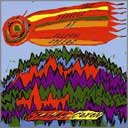
The casual observer might well have thought they had seen the last of Graham Coxon when he left Blur in 2002. For all his undoubted talent, the guitarist did not seem like solo star material. Throughout Blur's golden period, Coxon kept sending out subtle signals that the truly perceptive observer could have interpreted as implying a slight discomfort with celebrity, such as punching his record label boss, becoming an alcoholic and threatening to commit suicide at the party celebrating Country House's accession to number one.
Nor did the three solo albums he had recorded while with Blur do much to suggest a continued high profile was guaranteed. Scrappy and lo-fi, they seemed, despite Coxon's frequent protestations to the contrary, to exist primarily in order for him to moan about the other members of Blur. "Rock stars are not cool, they're full of this guy called Satan," he sang on the first, 1998's The Sky Is Too High. "You stabbed me in the back, you're lower than a snake," he offered on The Kiss of Morning, released a month after he left the band.
However, his next album, Happiness in Magazines (2004), defied expectations by being both listenable and apparently unconcerned with the ghastliness of Damon Albarn. It made the top 20 and spawned three charming hit singles: not enough to stop people asking when he was going to rejoin Blur - you rather suspect Coxon is still going to be asked if he's thinking of rejoining Blur on his deathbed - but more than most people would have expected.
In its own funny little way, the follow-up to Happiness shares a certain ambitiousness with the work of Coxon's former collaborator. Admittedly, there are no guest musicians from Africa, Dennis Hopper is noticeable by his absence and the chances of Madonna asking to collaborate on a multi-media extravaganza for the MTV Europe awards seem slim, but it does attempt to recast public perceptions of Coxon in a most improbable way. His specs, fourth-form haircut and wounded adolescent vocal style have never really suggested a whirlwind of bedhopping lubricity. And yet, here he is, his sleeve booklet decorated with drawings of nude women, variously depicting himself glistening with lustful sweat, lurking in a bathroom to tickle a lady's fancy behind her partner's back, and - if you interpret the second verse of Gimme Some Love in a certain light - on the receiving end of some vigorous manual relief. Odder still is the music he has chosen to convey his inner Priapus. For the most part, Love Travels at Illegal Speeds deals in old-fashioned, spirit of '77 punk rock: not the first music that springs to mind when thoughts turn to the boudoir.
Perhaps understandably, this results in the odd uncomfortable moment. It occasionally strays too close to the work of Jilted John, the cuckolded mock-punk who thought Gordon was a moron, while for all its cocksure lyrical brio, Don't Let Your Man Know brings to mind the slightly disturbing image of Tucker Jenkins trying to arrange an infidelity. But the fusion of spittle-flecked guitars and sexual longing isn't entirely incongruous or without precedent, most notably in the genderless lust songs penned by the Buzzcocks' Pete Shelley. At their best, that's who the uptempo tracks most obviously recall. There's a guileless, gleeful charm about I Can't Look at Your Skin and Gimme Some Love that blinds you to the troubling fact that you're listening to a man nearing his 40s singing about someone pulling him off in a schoolboy voice. They should, by rights, sound ridiculous, but instead they end up nagging away at you.
Something similarly compulsive is in evidence when Coxon tears himself away from the punk-rock blueprint. With its echoing slide guitar and disturbingly blank-eyed vocal, Just a State of Mind is audibly under the spell of Syd Barrett, while the closing See a Better Day has an air of White Album-period Lennon about it. Both seem understated, but their atmosphere of eerie, small-hours melancholy is gently pervasive. "I don't believe genre-hopping is any way a musical development," Coxon recently and rather pointedly remarked. That's a moot point, particularly if the person the comment is aimed at seems capable not just of genre-hopping, but of effortlessly mastering whatever genre he chooses to turn his hand to.
There's a nose-thumbing snottiness about the deliberately constrictive musical boundaries within which most of the album operates, but there's thankfully more to Love Travels at Illegal Speeds than defiantly blowing raspberries at you-know-who. Unpromising and unassuming at first glance, its highlights burrow under your skin and stay there. The most unlikely of solo careers keeps rolling idiosyncratically along.

